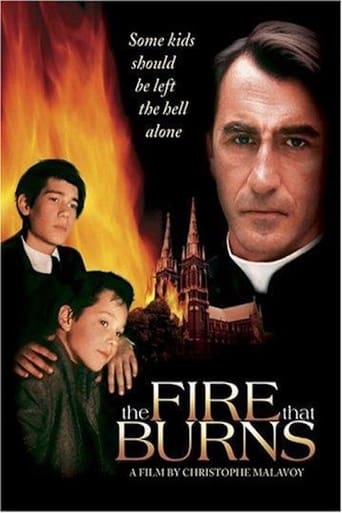fubared1
This is one of those badly made films that pretends to be about something (what, I don't know), but ends up being a tedious, bloated boor. In fact, the last 20 minutes of the 'film' are taken up by a dialog between 2 priests in which neither says anything of any interest to anyone. Yes, the central story is about a gay 'friendship' between 2 boys, but with no explanation as to why there is any attraction between the two. Yes there is a kiss between the two, but that's the only bit of physical contact. And of course, all the priests are pedophiles (not gay) which is the only realistic thing about this film and pseudo-sadists. And there is, mercifully, no mention of god or Christ or religion, even though this is a film about a Catiolic boys' school. And, unfortunately the two adult actors are quite poor. All in all this is a scattered, nihilistic, extremely dull mess of a film with little, if anything to recommend it. Don't waste your time.
Troye Dchgl
When it comes to an overall impression of this film, amid an organized story and compellingly emotional performances, it is still not absolutely satisfying, for it loses its grip when the film ends.The story mainly depicts the relationships of two friends of quite an age difference and a priest in a strictly-run boarding school. It is a movie that takes the subtle approach when tackling sensitive topics. The film uses characters of difficult purposes and thoughts to discuss "love", and the difference between a healthy friendship and a improper one.The subtlety sets in when ideas are sometimes expressed vaguely through the kind of talk you would expect from priests. The religious overtone veils the story as the plot nears its end, with relatively lengthy scenes of half-debate and half-reflection, bringing to movie to a closure. The ending is quite abrupt, though I account it challenging to end it any other way."The Fire that Burns" is along the lines of relationships and forbidden feelings, with religious overtones and philosophical as well as moral concerns. It is a simple story, but with an incredible depth of sentimental strength.
tim_trent
The spoiler is not about the plot, but about the ages of the two boys. To me they appeared to be 14 and 9 or so. Add 4 years to each boy's age and you get a more realistic love story within a school.I was not wholly satisfied with the plot, because it was rather banal, but I can't fault the acting, which was excellent, right down to the glint in Sevrais's eyes when he sees Souplier in the gym I wonder, too, if there was a pun or two in the boys' names: Sevrais "C'est Vrais" (for he told the truth a lot) and "Souplier" perhaps "Supplicant? The final scenes do call into question the entire church hierarchy and its "mastery" of sins of the flesh
willev1
We are told that this is the story of the love/friendship between two pupils at a repressive Catholic School for Boys in post-war France. One of the boys is a brilliant upperclassman, the other a much younger poor pupil with behavioral problems. As the movie opens, the friendship between these two is already established, but no explanation or dramatic incident is shown to justify this unlikely combination. Why would the older kid, about to graduate, bother with the younger boy? I know about schoolboy crushes, but aren't they usually between peers or from student to teacher? At the same time, the strict Abbot (the #2 priest at the school) has developed a powerful attraction to the younger boy as well, so that a rivalry is set in motion between the Abbot and the older boy for the affections of the younger one. All of this might be more believable if the child actor, the object of their affections, displayed some sort of magnetic charm/beauty/attraction. He doesn't. The two boys are meeting in secret. When eventually the older one bestows a kiss, the camera cuts away quickly and leaves the impression that something nasty is about to take place. I doubt it.What IS nasty is the power play and the the games used by the Abbot to eliminate his rival. All of this has been observed silently by the Father Superior who runs the school. The Abbot has his rival expelled, and the Father Superior gets rid of the younger one. Both boys disappear and are not seen again. So much for the "story" of their friendship!What remains is the powerful and extended final scene in which the Father Superior confronts the Abbot and chastises him for his abuse of power. They debate the issue of Christian love and charity, and the Abott must inevitably yield to the censure of his boss.We have here, then, a film that is primarily a character study of the repressed and devious Abbot, and how, in the name of "love," he abuses the students without laying a finger on them. This puts in perspective the later abuses of the Catholic clergy in times of looser restraints and more overt sexuality. It is fascinating, and the film will stay with you. I just wish they had expanded on the original stage play to make the basic situation more believable. A more charismatic actor as the youngster might have helped.
